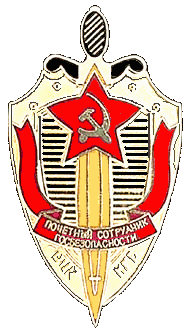





 Special Departments in the Armed Forces
Special Departments in the Armed ForcesSince the 1920s, an important internal security function of the security police has been ensuring the political reliability of the armed forces. This function was carried out through a network of so-called special departments (osobye otdely), which were under the supervision of the KGB's Third Chief Directorate. Officially designated as a military counterintelligence organization, the Third Chief Directorate performed tasks that extended far beyond counterintelligence to encompass extensive political surveillance of the military and other military security duties.
Special departments were responsible for security clearances of military personnel and for ensuring that security regulations and procedures were strictly observed in all branches of the armed forces. Thus they had control over (or at least immediate access to) military personnel files and information relating to the political reliability of members of the armed forces. The leadership claimed that their armed forces were continually threatened by ideological sabotage, i.e., attempts by Western governments to subvert individuals through bourgeois propaganda aimed at weakening their political convictions. Hence a key element of special department activities was political surveillance on both a formal and an informal level.
Officially, special departments were empowered to investigate armed forces personnel for the same crimes that were under KGB purview for ordinary citizens. In addition, the KGB had the authority to investigate military crimes defined in Article 259 of the Russian Republic's Code of Criminal Procedure--disclosure of a military secret or loss of a document containing a military secret. In investigating cases under their purview, special department employees were supposed to follow set rules of criminal procedure, but they did not always do so. In 1989, however, they no longer had the right to conduct trials, as they did during Stalin's time. Once an investigation was completed, the case was tried by special military tribunals under the Main Military Procuracy.
In addition to criminal investigations, the special departments had extensive informal responsibilities for ensuring the political reliability of the armed forces. Soviet authorities stated that they prevented political crimes by various preventive measures. Thus they carried on daily educational activities to increase political vigilance and communist ideological convictions among the armed forces and monitored telephone conversations and correspondence of military personnel. Special departments relied heavily on a broad network of informers, recruited from among military personnel.
The special departments were also charged with protecting all state and military secrets, including those involving nuclear weapons, a task that placed them in a position of considerable strategic importance. One Soviet official pointed out that "the reliable defense of Soviet forces from all types of espionage took on special significance when the basic defensive strength of the country came to consist of the most contemporary weapons systems, especially ballistic nuclear weapons."
According to Western sources, the KGB had custody and transport responsibilities for nuclear charges, which were separated from missiles and aircraft, until the late 1960s. At that time the KGB apparently relinquished its physical control over nuclear warheads, but it remained involved in the nuclear control process. Not only did it maintain a strategic communications network independent of the military communications system, but its responsibilities for protecting nuclear secrets presumably gave the KGB access to nuclear weapons installations as well as to military plans regarding the use of nuclear weapons.
Data as of May 1989
